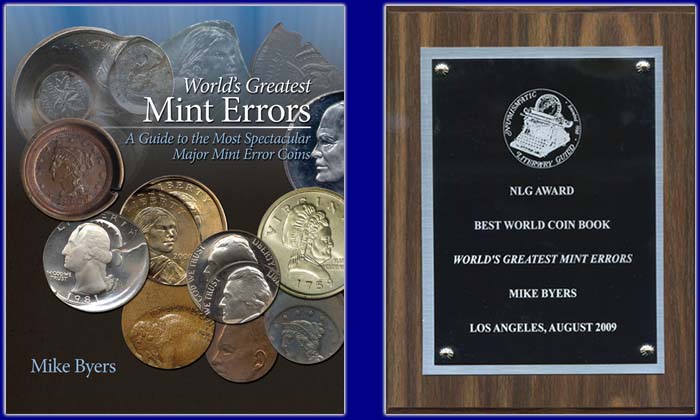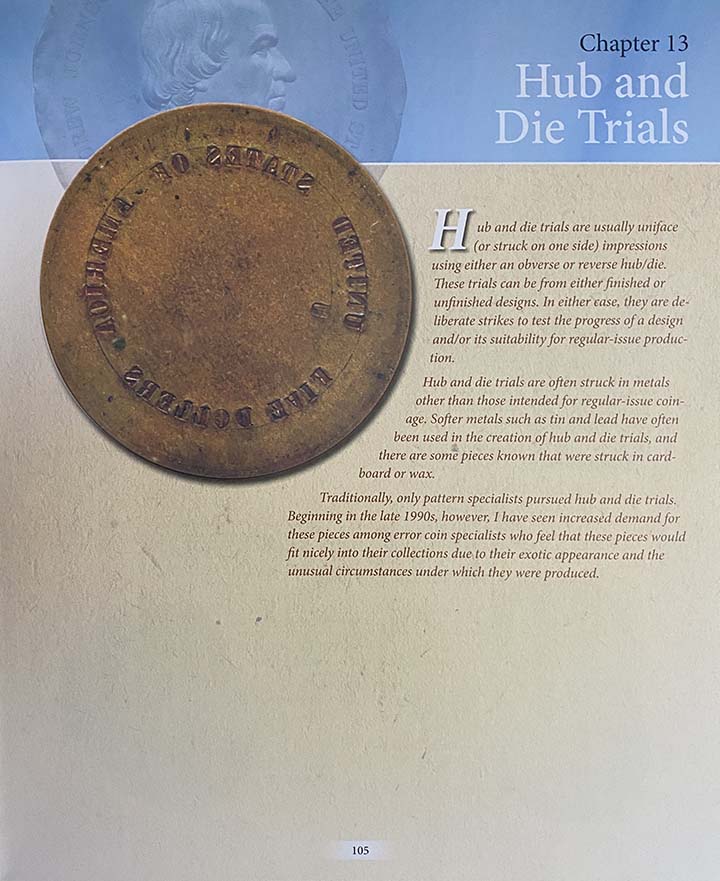1921 Peace Dollar Plaster
Designed & Sculpted by Anthony de Francisci
Unique in Private Hands
$60,000
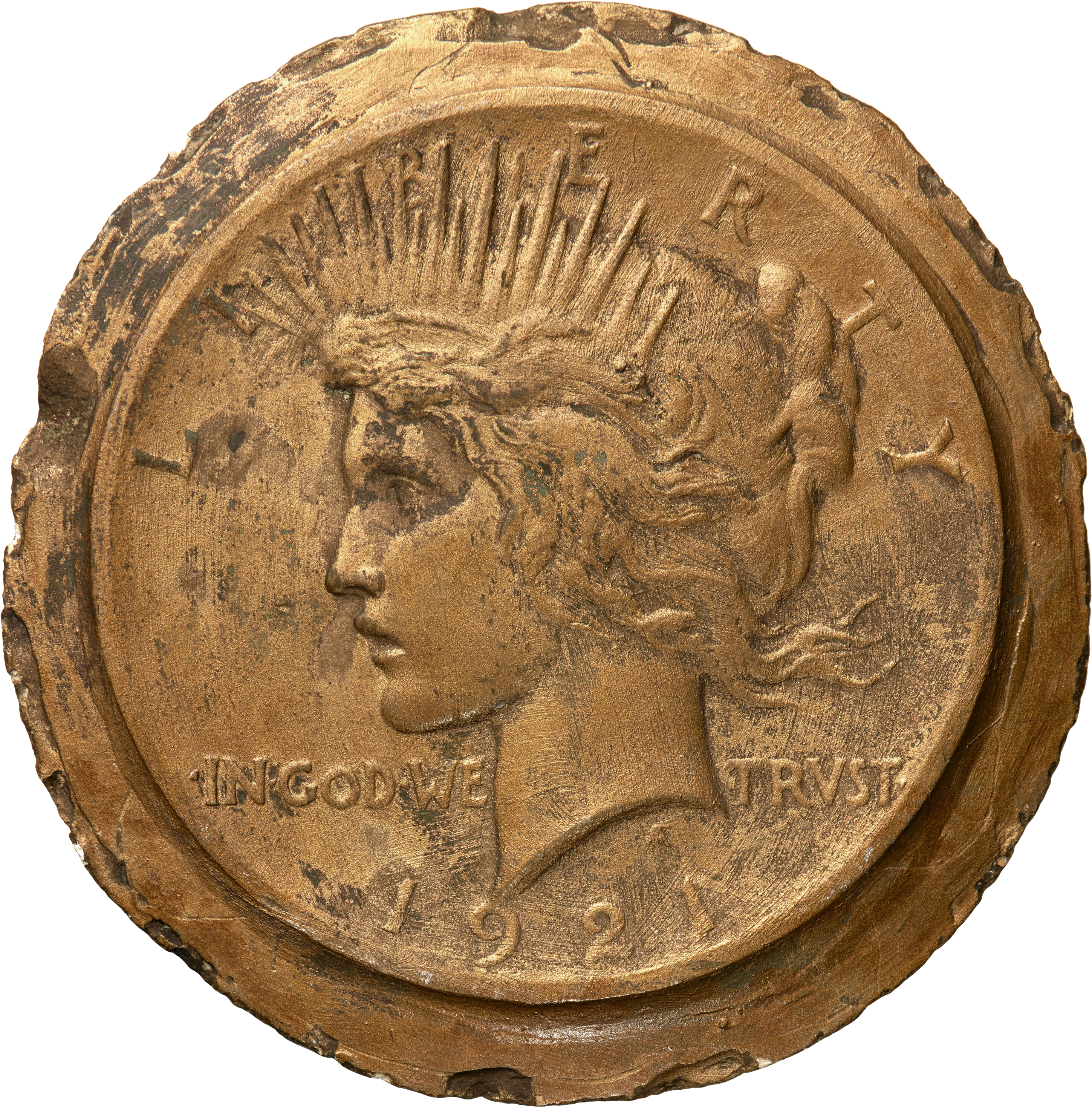
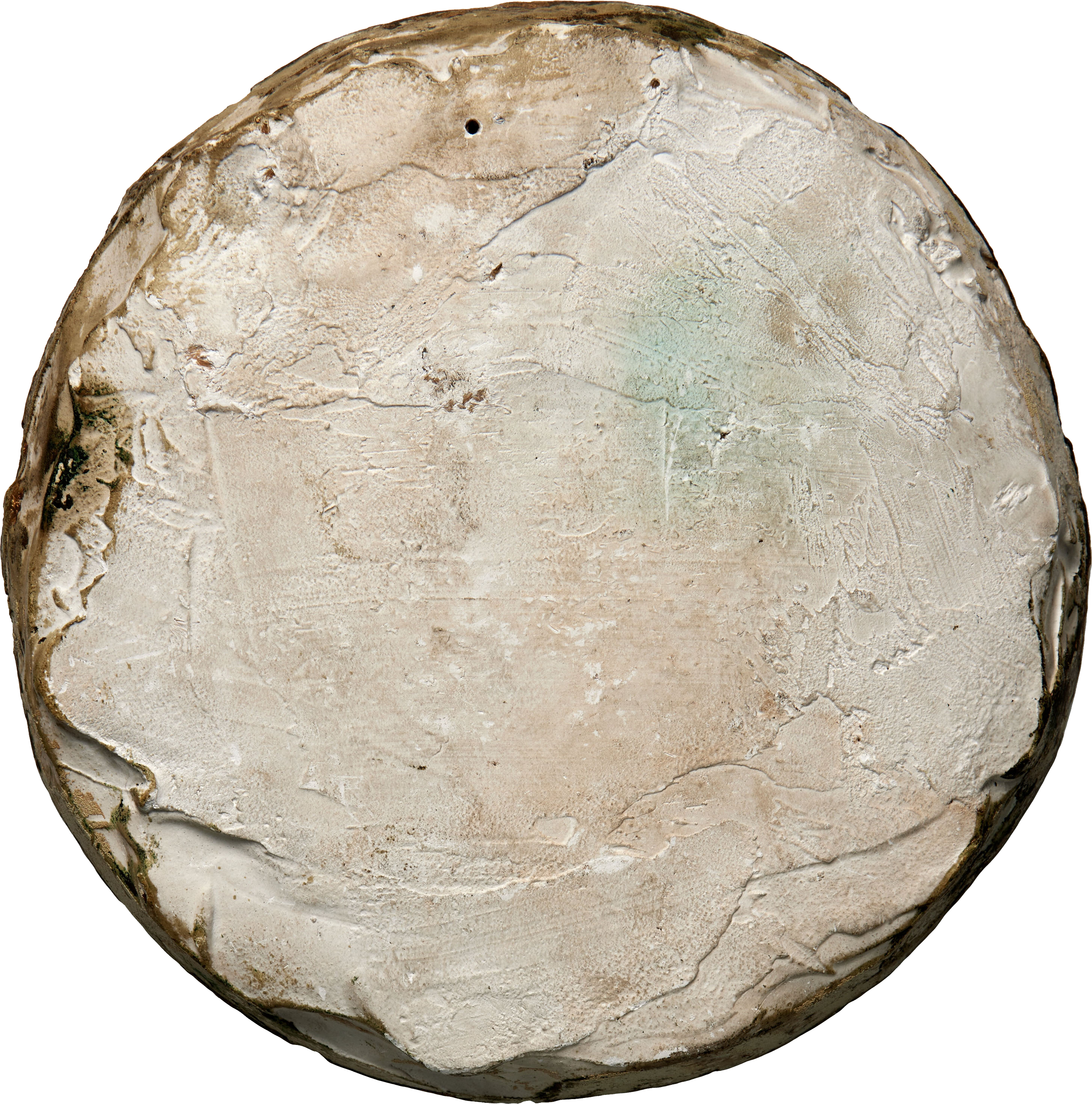
From the Mint Error News Featured Article:
This unique 1921 Peace Dollar splasher, now cataloged in Judd and certified by PCGS, along with the unique 1921 Peace Dollar plaster it was discovered with, are among the greatest numismatic discoveries of the 21st century. Quite simply there are no other known splashers or plaster models of the de Francisci 1921 Peace Dollar. These unique items first surfaced in 2020 and were previously unknown to the numismatic community.
The two pieces of this discovery are:
- Unique 1921 Peace Dollar obverse splasher by Anthony de Francisci (Judd A1921-1)
- Unique 1921 Peace Dollar obverse plaster by Anthony de Francisci
These items were first brought to the numismatic community by Steve Davis in 2020. The consigner indicates that they likely come from Victor Anthony de Meo (1882-1947) through his son William de Meo who both had relationships with Anthony de Francisci, James Earle Fraser, Laura Gardin Fraser, and others. The following is from Steve Davis:
According to the consignor, these items were likely the property of Victor de Meo, who passed in 1947 and were subsequently inherited by William de Meo. Victor was a sculpture artist and photographer who had a longtime professional relationship with James Earle Fraser. He frequently brought his son William to the Fraser NYC studio. There they met such luminaries of the time period as Charles Gibson, Lindbergh, Ann Harding. Jack Johnston, Charles Atlas, Elihu Root, Edwin Robinson. Victor photographed James Earle Fraser and Laura Gardin Fraser in studio settings as well as his and Laura's sculptures and sculpture subjects.The association of James Earle Fraser and Victor Anthony de Meo has been noted in various areas, including attribution of period photographs of James Earle Fraser's work to Victor de Meo, including his End Of The Trail Sculpture.
William served as an apprentice with James Earle Fraser around 1932, then opened a NYC studio of his own for 12 years before serving in World War II. William worked with many well known sculptors including Anthony de Francisci, Paul Manship and others, making plaster pieces. These rare coinage related items being offered for auction currently were handed down through the de Meo family, gifted from the original artists and later acquired at the estate sales of relatives of William. The most solid information surrounding these relationships came from a loose-leaf book that William produced, a notebook included in the group with hand written historical content and sketches dated 1935-36, as well as from letters and correspondence between James Earle Fraser and William de Meo.
Also, James Earle Fraser and Laura Gardin Fraser did not have any children, so it is plausible that these were gifted to Victor de Meo for his son William, one of 4 children Victor had with his wife Grace.
Both the plaster and splasher are mentioned in the book A Guide Book of Peace Dollars by Roger W. Burdette, discussed more below.
The Peace Dollar plaster is an incredible discovery as it is not only the only known plaster for de Francisci's 1921 Peace Dollar, it is also mentioned in the history of the Peace Dollar. It is 8 3/4" diameter and 1 1/4" thick, a common size for plaster models, and one can imagine evaluating designs at this scale.
The existence of a plaster was reported to have been given to James Earle Fraser on December 18, 1921, and this may be that very plaster model. After winning the Peace Dollar design competition on Tuesday, December 13, 1921 in James Earle Fraser's New York City studio, Anthony de Francisci was instructed to make some changes for a final submission, including changing the date from from Roman-style numerals to European-style numerals which can be seen on this piece. Roger Burdette indicates that Anthony de Francisci made two sets of models to present and left one in New York with Fraser:
De Francisci worked on the final models through Saturday and completed them on Sunday, December 18. He made two sets of models and left one set with Fraser in New York. The second set and the sketch models he took to Washington for final approval the next day.
The plaster model is made of white alabaster plaster with a yellow-ochre applied finish. It is 8 3/4" diameter and 1 1/4" thick. It was noted by Steve Davis as "Overall EF, some minor chipping about the edge and mottled variation in the surface coloration due to age and some transient surface adhesion and deposits." Of note, this model is unsigned, like the design competition piece.
With the information available, the provenance for this piece is likely:
Pedigree: Anthony de Francisci; James Earle Fraser; Victor Anthony de Meo; William de Meo; de Meo family; Numismatic Auctions LLC.



1921 Peace Dollar Splasher Die Trial (Judd A1921-1)
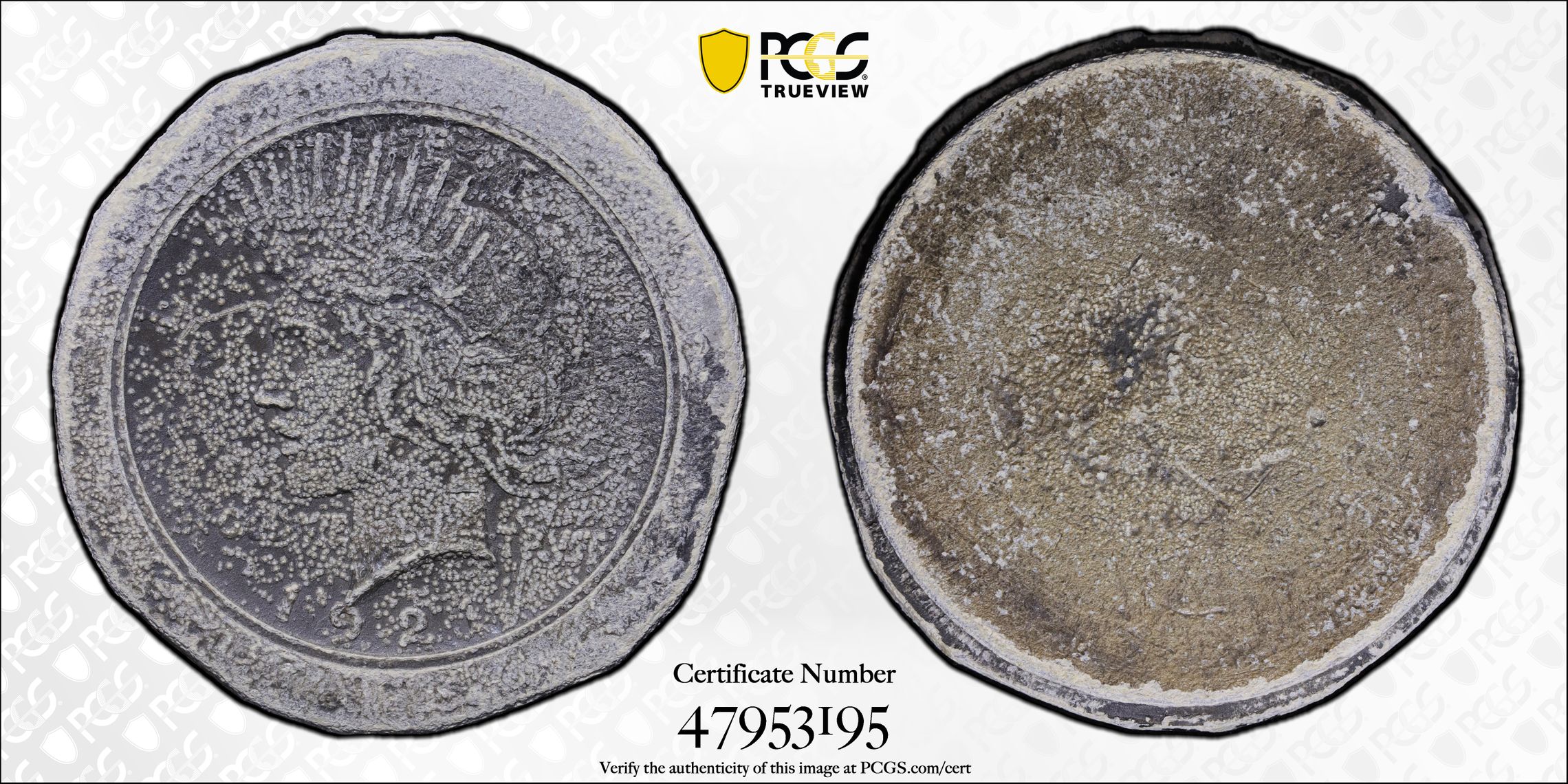
The discovery of the unique 1921 lead splasher is a monumental event as it has been alluded to in Mint correspondence in a December 23, 1921 letter from Raymond Thomas Baker, Director of the Mint to Secretary Andrew William Mellon for approval of the design. The letter is as follows from Roger Burdette's book A Guide Book of Peace Dollars:
I have the honor to submit models [samples] of the proposed designs for the Standard Silver Dollar. [...]Roger W. Burdette adds that the models mentioned were likely lead splashers.
The model as now submitted as the approval of the Fine Arts Commission, and is in compliance with the requirements of the law.
Respectfully,
R.T. Baker, Director of the Mint
The samples were likely lead "splashers" or small plaster casts, there being no time to harden the hubs and make dies. Undersecretary Gilbert approved [...] and the mint continued preparing master and working dies. Baker wired his approval on December 24.
Anthony de Francisci had been on site at the Philadelphia Mint during this time, having been requested by James Fraser to be present to work with George Morgan on refining the design. Given this, it is possible that this is one of the US Mint splashers created on December 23, 2021 for review by Treasury and Mint officials, and was retained by Anthony de Francisci.
Andy Lustig, a U.S. pattern expert and Mint Error News consultant, was shown this piece and indicated his opinion that it is a genuine U.S. Mint product from an original die:I have performed an in-person evaluation of the unique 1921 Peace Dollar Splasher (cataloged as Judd A1921-1), and am of the opinion that the splasher is a genuine U.S. Mint product. |
It is struck on an oversized planchet 45mm in diameter overall and 5mm thick, weighing in at 77.1 grams. The splasher is oxidized with a thick grayish-pewter colored patina, with a couple light marks likely part of the production process.
This has been recognized in the Judd reference for pattern coins as Judd "A1921-1" and certified by PCGS as such.
With the information available, the provenance for this piece is likely the following. It is also possible that Anthony de Francisci gave this piece to James Earle Fraser as he did a set of plasters discussed below.
Pedigree: Anthony de Francisci; (possibly James Earle Fraser;) Victor Anthony de Meo; William de Meo; de Meo family; Numismatic Auctions LLC.
Featured in Mint Error News Magazine
2023 Special Edition Volume Two
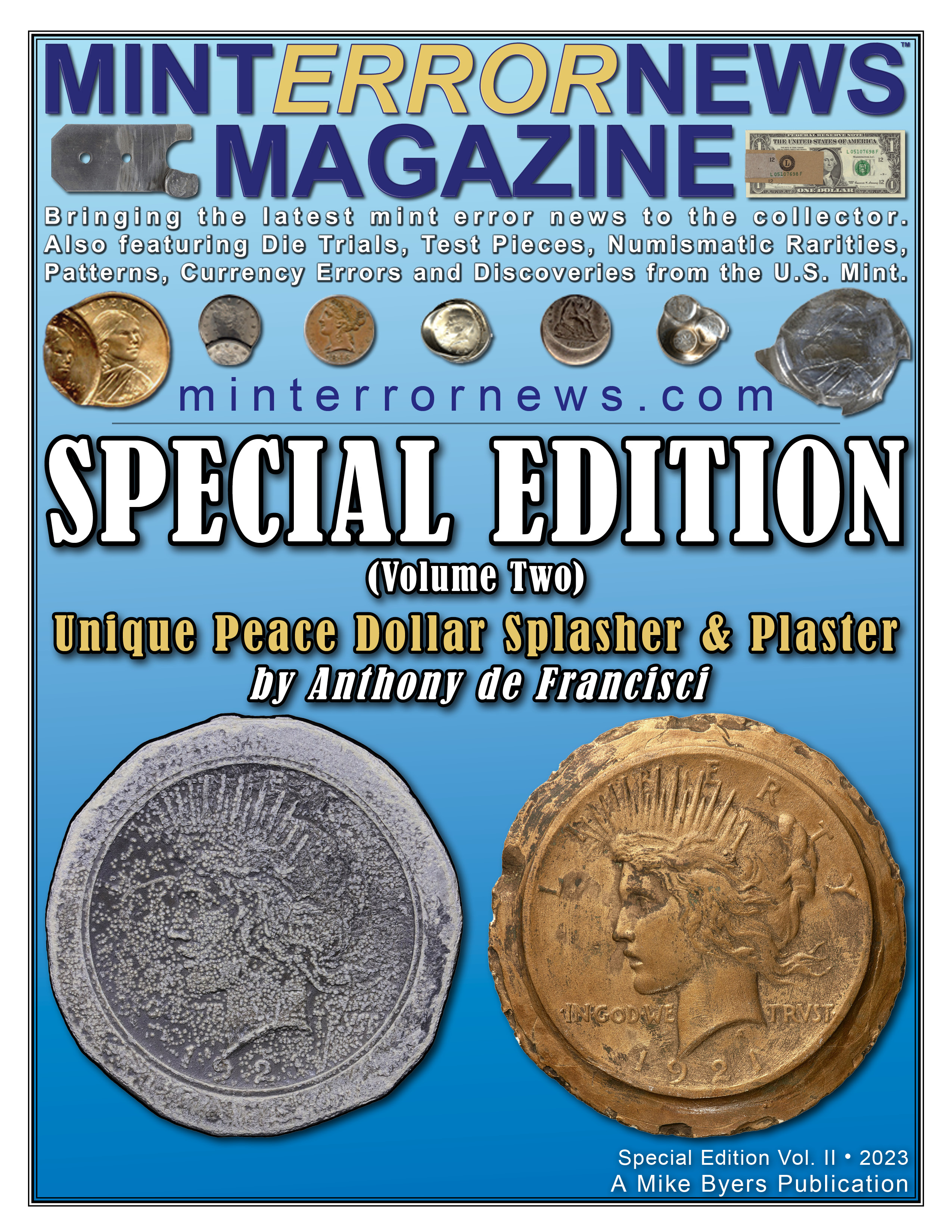
Die Trials are featured in my NLG Award winning book,
World's Greatest Mint Errors.
